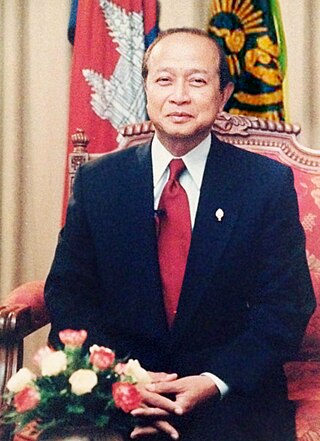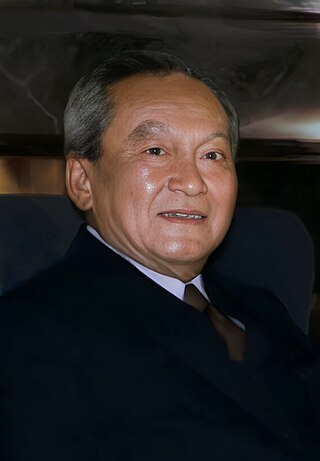
The Democratic Action Party is a centre-left social democratic political party in Malaysia. As one of four component parties of the Pakatan Harapan (PH) coalition, it formed the federal government after defeating Barisan Nasional (BN) in the 2018 Malaysian general election, ending the party's 53 year-long stay in the opposition. However, before the coalition finished its first term, defections from partnering parties caused it to lose power after 22 months, culminating in the 2020 Malaysian political crisis. At the 2022 Malaysian general election, the PH coalition which the DAP was part of was returned to power again, albeit without a majority, leading it to form a unity government with political rivals. It is one of the four component parties of the Pakatan Harapan ruling coalition in Malaysia.

Kriangsak Chamanan served as prime minister of Thailand from 1977 to 1980. After staging a successful coup, he was asked to become Prime Minister in 1977. He ruled till 1980 and is credited with "steering Thailand to democracy" in a time where communist insurgents were rampant internally and neighbouring countries turned to communist rule following the communist takeover of Vietnam: South Vietnam, Laos, and Cambodia.

Norodom was King of Cambodia from 19 October 1860 to his death on 24 April 1904. He was the eldest son of King Ang Duong and was a half-brother of Prince Si Votha and King Sisowath. He was elected to the throne in 1860 but would not be crowned until 1864 because Siam held the royal regalia.

Norodom Ranariddh was a Cambodian politician and law academic. He was the second son of King Norodom Sihanouk of Cambodia and a half-brother of King Norodom Sihamoni. Ranariddh was the president of FUNCINPEC, a Cambodian royalist party. He was also the first Prime Minister of Cambodia following the restoration of the monarchy, serving between 1993 and 1997, and subsequently as the President of the National Assembly between 1998 and 2006.

Norodom Chakrapong is a Cambodian politician, businessman and former major-general of the Royal Cambodian Armed Forces. He is the fourth son of Norodom Sihanouk of Cambodia and also a half-brother of the current king, Norodom Sihamoni. Chakrapong started his career as a military pilot in 1963. After Sihanouk was overthrown in 1970, Chakrapong spent time under house arrest, then in Beijing as the Head of Protocol of then-Prince Sihanouk, afterwards living overseas before he joined the Funcinpec in 1981 and fought against Vietnamese occupation as a commander of the Armée Nationale Sihanoukiste. In 1991, Chakrapong left Funcinpec to join the Cambodian People's Party (CPP) and served as the Deputy Prime Minister of Cambodia between 1992 and 1993. When the CPP lost the 1993 general elections, Chakrapong led a secession attempt in 1993. In 1994, he was accused of joining a failed coup attempt which led him to be sent into exile. After Chakrapong was pardoned in 1998, he founded a private airline company, Royal Phnom Penh Airways. The airlines later stopped all operations in early 2006.

Chatichai Choonhavan was a Thai army officer, diplomat and politician. From 1986 to 1991, he was the chairman of the Thai Nation Party and served as the Prime Minister of Thailand from August 1988 until the 1991 coup d'état.

Cài is a Chinese-language surname that derives from the name of the ancient Cai state. In 2019 it was the 38th most common surname in China, but the 9th most common in Taiwan, where it is usually romanized as "Tsai", "Tsay", or "Chai" and the 8th most common in Singapore, where it is usually romanized as "Chua", which is based on its Teochew and Hokkien pronunciation. Koreans use Chinese-derived family names and in Korean, Cai is 채 in Hangul, "Chae" in Revised Romanization, It is also a common name in Hong Kong where it is romanized as "Choy", "Choi" or "Tsoi". In Macau, it is spelled as "Choi". In Malaysia, it is romanized as "Choi" from the Cantonese pronunciation, and "Chua" or "Chuah" from the Hokkien or Teochew pronunciation. It is romanized in the Philippines as "Chua" or "Chuah", and in Thailand as "Chuo" (ฉั่ว). Moreover, it is also romanized in Cambodia as either "Chhay" or "Chhor" among people of full Chinese descent living in Cambodia and as “Tjhai”, "Tjoa" or "Chua" in Indonesia.
The following are international rankings of Thailand.

The Southeast Asian Nuclear-Weapon-Free Zone Treaty (SEANWFZ), or the Bangkok Treaty of 1995, is a nuclear weapons moratorium treaty between 10 Southeast Asian member-states under the auspices of the ASEAN: Brunei, Cambodia, Indonesia, Laos, Malaysia, Myanmar, Philippines, Singapore, Thailand, and Vietnam. It was opened for signature at the treaty conference in Bangkok, Thailand, on 15 December 1995 and it entered into force on March 28, 1997 and obliges its members not to develop, manufacture or otherwise acquire, possess or have control over nuclear weapons.

Malaysia–Thailand relations refer to bilateral foreign relations between the two neighbouring countries, Malaysia and Thailand. Thailand has an embassy in Kuala Lumpur, and consulate-general offices in George Town and Kota Bharu. Malaysia maintains an embassy in Bangkok and a consulate-general in Songkhla. During Mahathir Mohamad's second term as the Prime Minister of Malaysia from 2018 to 2020, he made four visits to Thailand.

The 1997 Cambodian coup d'état took place in Cambodia from July to September 1997. As a result, co-premier Hun Sen ousted the other co-premier Norodom Ranariddh. At least 32 people were killed during the coup.
The by-election was held on 10 July 1965, with the nomination day held on 30 June 1965. Legislative Assembly member and chief of United People's Party Ong Eng Guan resigned his seat, precipitating a by-election for the Hong Lim Constituency. This is the last by-election for the Legislative Assembly prior to Singapore's expulsion from Malaysia and its independence.

Culinary diplomacy, gastrodiplomacy or food diplomacy is a type of cultural diplomacy, which itself is a subset of public diplomacy. Its basic premise is that "the easiest way to win hearts and minds is through the stomach". Official government-sponsored culinary diplomacy programs have been established in Taiwan, South Korea, Singapore, Thailand, Malaysia, Indonesia, Lebanon, Peru, Israel, the United States, Cambodia, Japan, and Nordic countries.

Cambodia–Malaysia relations are foreign relations between Cambodia and Malaysia. Both countries are members of ASEAN. Cambodia has an embassy in Kuala Lumpur, and Malaysia has an embassy in Phnom Penh.

On 22 May 2014, the Royal Thai Armed Forces, led by Prayut Chan-o-cha, the commander-in-chief of the Royal Thai Army, launched a coup d'état, the twelfth since the country's first coup in 1932, against the caretaker government following six months of political crisis. The military established a junta called the National Council for Peace and Order (NCPO) to govern the nation. The coup ended the political conflict between the military-led regime and democratic power, which had been present since the 2006 Thai coup d'état known as the "unfinished coup". Seven years later, it developed into the 2020–2021 Thai protests to reform the monarchy of Thailand.
Tong Siv Eng was a Cambodian politician. She was the first female member of parliament, and the first female cabinet minister, in Cambodia.

Bilateral relations between the Republic of Singapore and the Kingdom of Thailand formally date to 1965, when Thailand established diplomatic relations soon after the independence of Singapore. Both countries are the founding members of the Association of Southeast Asian Nations.













